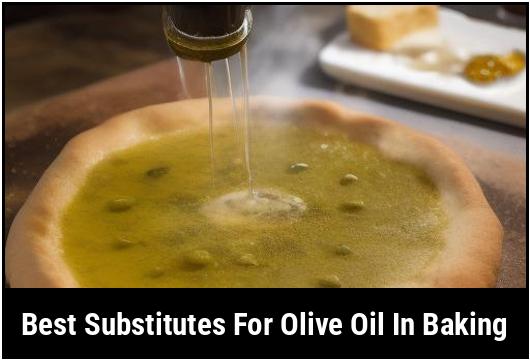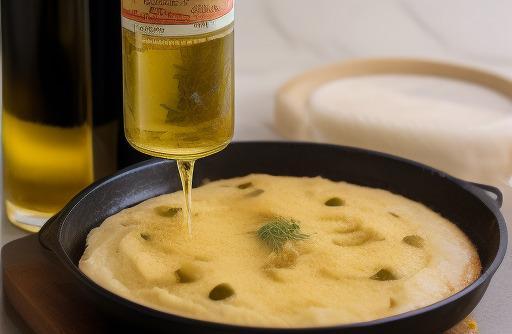Best Substitutes For Olive Oil In Baking

Olive oil is a staple ingredient in many baking recipes, known for its rich flavor and health benefits. However, there are times when you may find yourself out of olive oil or simply prefer to use an alternative in your baking. Luckily, there are several excellent substitutes that can be used to achieve similar results. In this article, we will explore the best substitutes for olive oil in baking and provide tips for choosing the right one for your recipe.
Key Takeaways
- Olive oil can be substituted with several ingredients in baking, including vegetable oils, coconut oil, and butter.
- Each substitute will bring its own unique flavor and texture to the baked goods.
- Consider the smoke point, flavor profile, and health benefits when choosing a substitute.
- Experimenting with different substitutes will help you discover your own personal preference.
Why You Need A Substitute For Olive Oil In Baking
There are several reasons why you may need a substitute for olive oil in baking. Some individuals may have dietary restrictions that prevent them from consuming olive oil, while others may simply prefer the taste of an alternative. Additionally, you may find yourself in a situation where you run out of olive oil and need a replacement at the last minute. Whatever the reason, knowing the best substitutes will ensure that you can continue baking without compromising the quality of your final product.
Types Of Substitutes For Olive Oil In Baking

-
Vegetable Oils: Vegetable oils, such as canola, sunflower, or safflower oil, are frequently used as substitutes for olive oil in baking. These oils have a neutral flavor and can easily replace olive oil in most recipes without altering the taste significantly. They have a higher smoke point than olive oil, making them ideal for baking at high temperatures.
-
Coconut Oil: Coconut oil is another popular alternative for olive oil in baking. It has a distinct flavor that may add a tropical twist to your baked goods. Coconut oil has a solid form at room temperature, so it needs to be melted before using it as a substitute. It adds moisture to baked goods and can lend a subtle coconut aroma.
-
Butter: Butter is a classic substitute for olive oil in baking. It adds a rich flavor and a tender texture to your baked goods. However, keep in mind that butter contains dairy, so it may not be suitable for those with dairy allergies or dietary restrictions. If using butter as a substitute, make sure to adjust the amount accordingly since butter is not a one-to-one replacement for olive oil.
-
Applesauce: For those looking to reduce the amount of fat in their baked goods, applesauce can be an excellent substitute for olive oil. It adds moisture to the recipe while keeping it low in fat. Applesauce can also lend a subtle fruity flavor to your baked goods. When using applesauce as a substitute, replace the olive oil with an equal amount of applesauce.
-
Greek Yogurt: Greek yogurt is another healthy substitute for olive oil in baking. It adds moisture and richness to your baked goods, while also providing a tangy flavor. Use an equal amount of Greek yogurt as a replacement for olive oil.
Best Substitutes For Olive Oil In Baking
-
Canola Oil: Canola oil is an excellent substitute for olive oil in baking due to its neutral flavor and high smoke point. It is derived from the seeds of the canola plant and is widely available. Replace olive oil with an equal amount of canola oil in your baking recipes. The substitution will be seamless, and you won’t notice a significant difference in taste or texture.
-
Coconut Oil: As mentioned earlier, coconut oil can be used as a substitute for olive oil in baking. Melt the coconut oil before using it in your recipe. The amount of coconut oil needed may vary based on the recipe, but in general, you can replace olive oil with an equal amount of melted coconut oil. Keep in mind that coconut oil has a distinct flavor, so it may alter the taste of your final product.
-
Butter: Butter is a classic substitute for olive oil in baking. It adds a rich and creamy flavor to your baked goods. However, butter has a higher moisture content compared to olive oil, so it may affect the overall texture of your recipes. When using butter as a substitute, use 1 cup of melted butter for every 1 cup of olive oil.
-
Applesauce: Applesauce is a healthy substitute for olive oil in baking, particularly for recipes that require a moist texture. It works well in recipes like cakes, muffins, and quick breads. Replace olive oil with an equal amount of applesauce to maintain the desired moisture level in your baked goods. Keep in mind that using applesauce as a substitute may result in a slightly different flavor profile.
-
Greek Yogurt: Greek yogurt can be used as an alternative to olive oil in baking. It adds moisture and a slight tangy flavor to your recipes. When using Greek yogurt in place of olive oil, substitute an equal amount of Greek yogurt. This substitution works well in recipes like cakes, brownies, and muffins.
Choosing The Right Substitute For Olive Oil In Baking
When choosing a substitute for olive oil in baking, there are a few factors to consider:
-
Flavor Profile: Consider the flavor profile of the substitute and how it will complement your recipe. For example, vegetable oils have a neutral taste, while coconut oil adds a tropical twist. Butter adds richness, and applesauce lends a fruity flavor.
-
Smoke Point: The smoke point of the substitute is important, especially when baking at high temperatures. Vegetable oils have higher smoke points than olive oil, making them suitable for baking at high heats.
-
Health Benefits: Consider the health benefits of the substitute. For example, coconut oil has been praised for its potential health benefits, but it is high in saturated fat. Vegetable oils like canola or sunflower oil are often considered healthier options due to their lower saturated fat content.
-
Allergies and Dietary Restrictions: Keep in mind any allergies or dietary restrictions when choosing a substitute. For those with dairy allergies or lactose intolerance, butter may not be a suitable choice.
By considering these factors, you can choose the right substitute that will best suit your preferences and dietary needs.
Cooking With Substitutes For Olive Oil In Baking

Using substitutes for olive oil in baking may require some adjustments in your recipe. Here are a few tips to keep in mind while cooking with these substitutes:
-
Texture: Substituting olive oil with butter may result in a denser texture due to the higher moisture content in butter. To maintain the desired texture, consider adjusting the amount of leavening agents like baking powder or baking soda.
-
Flavor: Each substitute brings its own unique flavor to the recipe. For example, using coconut oil will add a coconut flavor, while butter will add richness. Make sure the substitute complements the other ingredients and flavors in your recipe.
-
Melting Point: If using coconut oil or butter as a substitute, make sure to melt them before adding them to the recipe. This ensures proper distribution and integration with the other ingredients.
-
Ratio: When using a substitute, it’s essential to maintain the right ratio. In most cases, a one-to-one replacement will suffice. However, in the case of butter or applesauce, slight adjustments may be necessary based on the recipe’s requirements.
Remember that experimentation is key. While these tips provide a starting point, feel free to adjust and adapt as you explore different substitutes and refine your baking skills.
Pro Tip: To ensure a successful substitution, start by replacing only a portion of the olive oil with a substitute and gradually increase the amount in future recipes until you achieve the desired taste and texture.
Recipes Using Substitutes For Olive Oil In Baking
- Canola Oil Chocolate Cake
Ingredients:
- 2 cups all-purpose flour
- 1 ¾ cups granulated sugar
- ¾ cup unsweetened cocoa powder
- 1 ½ teaspoons baking powder
- 1 ½ teaspoons baking soda
- 1 teaspoon salt
- 2 large eggs
- 1 cup milk
- ½ cup canola oil
- 2 teaspoons vanilla extract
- 1 cup boiling water
Instructions:
-
Preheat the oven to 350°F (175°C). Grease and flour two 9-inch round cake pans.
-
In a large mixing bowl, whisk together the flour, sugar, cocoa powder, baking powder, baking soda, and salt.
-
Add the eggs, milk, canola oil, and vanilla extract to the dry ingredients. Mix until well combined.
-
Stir in the boiling water and mix until the batter is smooth.
-
Pour the batter evenly into the prepared cake pans.
-
Bake for 30-35 minutes, or until a toothpick inserted into the center of the cakes comes out clean.
-
Allow the cakes to cool in the pans for 10 minutes, then transfer them to a wire rack to cool completely.
-
Once cooled, frost with your favorite frosting and enjoy!
-
Coconut Oil Blueberry Muffins
Ingredients:
- 2 cups all-purpose flour
- 1 ½ teaspoons baking powder
- ½ teaspoon baking soda
- ½ teaspoon salt
- ¼ cup melted coconut oil
- ¾ cup granulated sugar
- 1 large egg
- 1 cup buttermilk
- 1 teaspoon vanilla extract
- 1 ½ cups fresh blueberries
Instructions:
- Preheat the oven to 375°F (190°C). Line a muffin tin with paper liners.
- In a medium bowl, whisk together the flour, baking powder, baking soda, and salt.
- In a separate large bowl, mix together the melted coconut oil and sugar until well combined.
- Add the egg, buttermilk, and vanilla extract to the coconut oil mixture. Whisk until smooth.
- Gradually add the dry ingredients to the wet ingredients, mixing until just combined.
- Gently fold in the blueberries.
- Divide the batter evenly among the paper liners, filling each about two-thirds full.
- Bake for 18-20 minutes or until a toothpick inserted into the center of a muffin comes out clean.
- Allow the muffins to cool in the tin for 5 minutes, then transfer them to a wire rack to cool completely.
Storage And Shelf Life Of Substitutes
When using substitutes for olive oil in baking, it’s important to consider their storage and shelf life.
-
Vegetable Oils: Vegetable oils have a long shelf life and can be stored at room temperature in a cool, dark place. Ensure that the bottle is tightly sealed to prevent oxidation. Using a fresh bottle of vegetable oil will yield the best results in terms of flavor and quality.
-
Coconut Oil: Coconut oil has a long shelf life and can be stored at room temperature. Keep it in a cool, dry place away from direct sunlight. Since coconut oil solidifies at cooler temperatures, it may become solid if stored in the refrigerator. If this happens, simply warm it gently until it liquefies before use.
-
Butter: Butter should be stored in the refrigerator to maintain its freshness. It is best used within a few weeks of purchase. If you have excess butter, it can be stored in the freezer for several months. When using frozen butter as a substitute for olive oil, remember to thaw it before using.
-
Applesauce: Opened applesauce should be refrigerated and consumed within a week. Unopened applesauce can be stored at room temperature. If you have leftover applesauce, consider freezing it in an airtight container for future use.
-
Greek Yogurt: Greek yogurt should be refrigerated and consumed within the designated expiration date. Opened containers should be used within a week. Greek yogurt can also be frozen for longer storage. If using frozen Greek yogurt as a substitute, thaw it before using in your recipes.
Conclusion
When it comes to baking, olive oil can be easily substituted with a variety of ingredients, such as vegetable oils, coconut oil, butter, applesauce, and Greek yogurt. Each substitute brings its own unique flavor and texture to the baked goods, allowing you to experiment and find your preferred choice. When choosing a substitute, consider factors such as flavor profile, smoke point, health benefits, allergies, and dietary restrictions. By following the tips provided and trying out the recommended recipes, you can confidently bake delicious treats even without olive oil on hand. So go ahead, explore the substitutes, and continue to enjoy the art of baking!
FAQS
What Are Some Possible Substitutes For Olive Oil In Baking?
Some of the best substitutes for olive oil in baking include canola oil, coconut oil, vegetable oil, sunflower oil, and avocado oil.
Is Canola Oil A Good Substitute For Olive Oil In Baking?
Yes, canola oil is a great substitute for olive oil in baking because it has a mild flavor and high smoke point that won’t overpower your baked goods.
Can I Substitute Coconut Oil For Olive Oil In Baking?
Absolutely! Coconut oil is a popular alternative to olive oil that can add a lovely flavor and texture to baked goods, especially when baking vegan or gluten-free recipes.
What Is The Difference Between Vegetable Oil And Olive Oil When Used In Baking?
Unlike olive oil, vegetable oil is a blend of different oils (such as soybean, canola, and corn) that are extracted from various sources. It has a neutral flavor and can be a good substitute for olive oil in baking if you don’t want the distinctive flavor of the latter.
Can I Use Sunflower Oil As A Substitute For Olive Oil In Baking?
Yes, sunflower oil is a healthy cooking oil that can be used in place of olive oil in baking. It has a high smoke point and a mild flavor that works well in most recipes. However, keep in mind that it may affect the taste of your baked goods.
Sources
About the Author Jenny
I'm Jenny, a housewife with an unwavering passion for food. My culinary journey began with my grandmother's kitchen, and it's now a full-fledged food blog. I've turned my love for cooking into a creative outlet, sharing recipes and stories with a global community of fellow food enthusiasts. It's proof that being a housewife can also mean pursuing your passions and savoring life's delectable moments.
